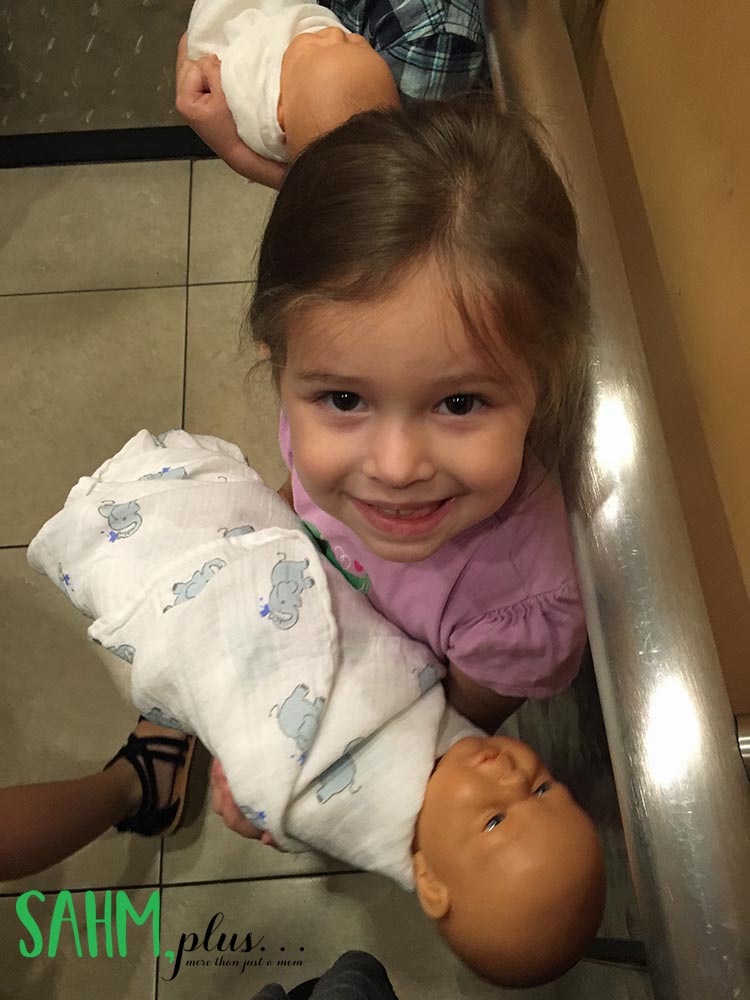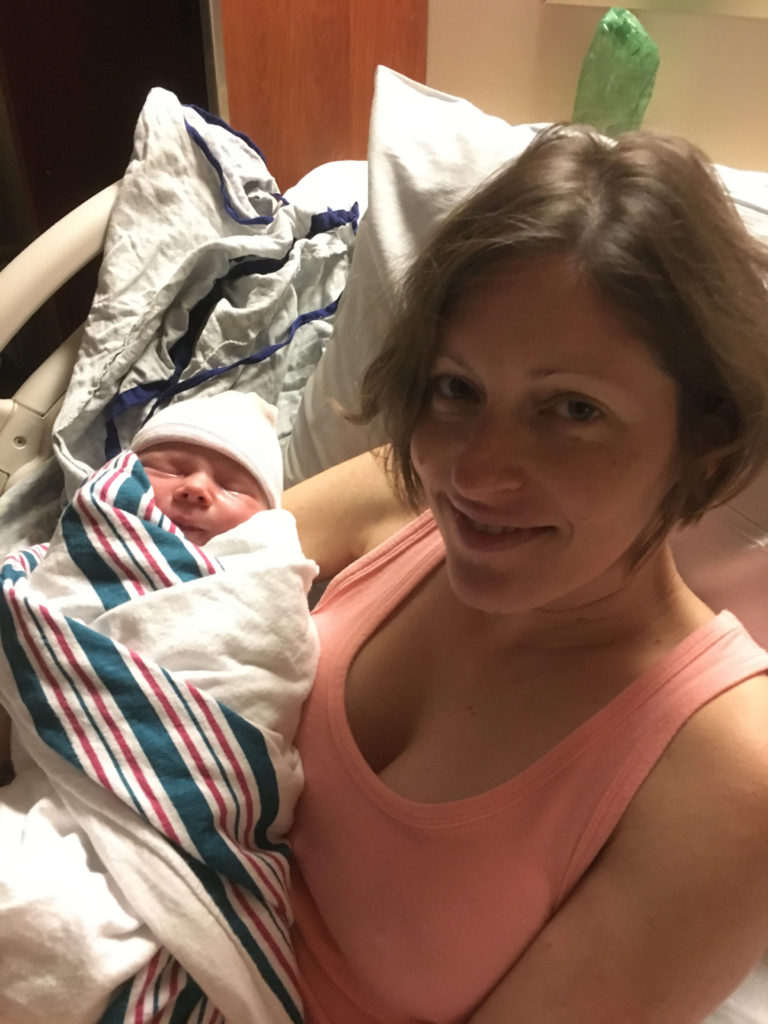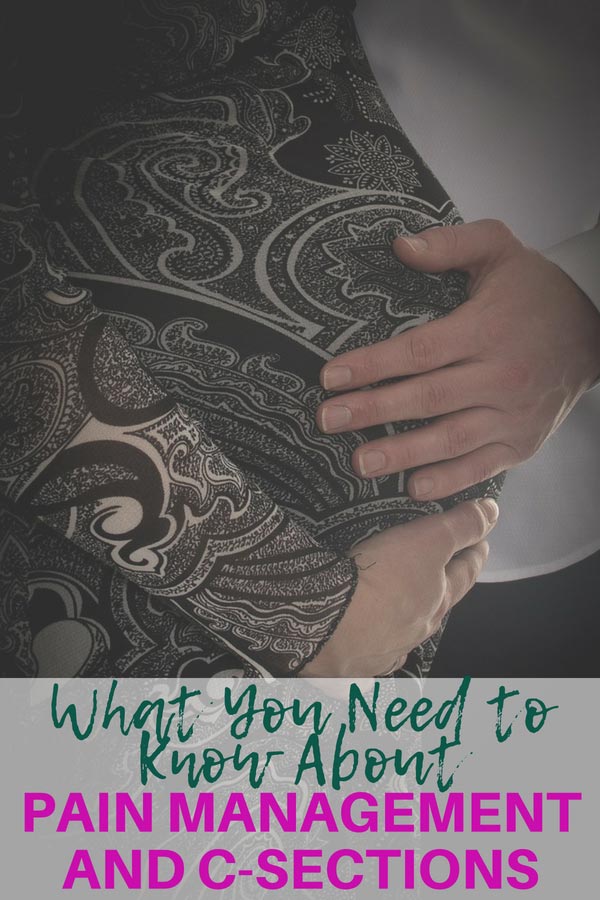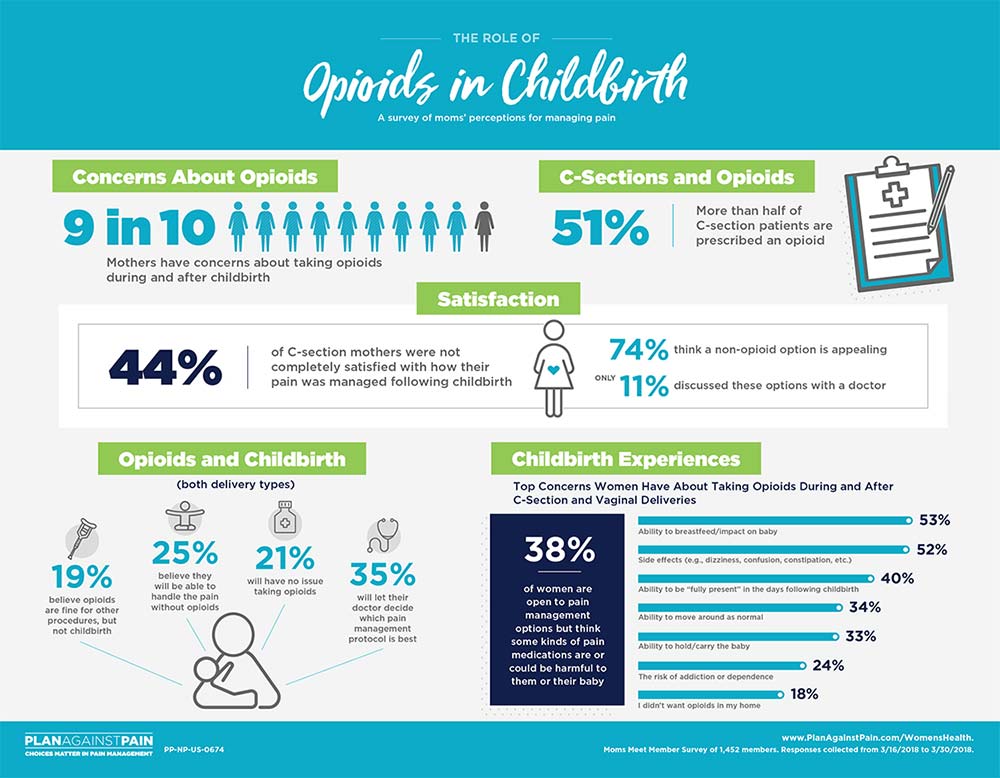Sometimes having a birth plan isn’t enough. Learn about pain management for c-sections and opioids use and alternatives to discuss with your provider.
So, you’ve decided to have a baby. Congratulations.
In the months leading up to delivery, you’ll likely realize there was way more involved in childbirth than you probably ever thought about.
If you’re newly pregnant or thinking about becoming pregnant, have you given any thought to your pain medications? I mean, really? Like have you thought in detail about c-sections and opioids?
Most of us don’t jump into deciding to get pregnant thinking about the choices we’ll be making for our birth plans.
Generally, it goes something like this …
You’ve waited forever to become a mom or maybe you weren’t even planning on it and it just happened.
You deal with the anxiety and anticipation about how you’re going to raise your little bundle of joy.
Picking the perfect baby name, buying fabulous furniture for the nursery, and making a baby registry are top priority.
At some point, you move into the heavy parenting stuff like taking childbirth classes and deciding who you want in the delivery room. Maybe you’ll even take newborn care classes, because you’re concerned about how to change a diaper.

At a sibling class as we prepared for the second baby
You’re sure, with all this preparation, you’re equipped with the knowledge you need to have a happy, healthy baby.
Unfortunately, your worries aren’t over just yet.
You’ll find yourself wondering what drugs are safe during pregnancy if you get a headache, have body aches and pains, or come down with an illness. And you’ll often have to make decisions about whether or not you’re willing to risk even a minute chance that a medication has a side effect.
The truth is, there is always something that’s going to come up that you’re not going to be prepared for. Your pregnancy isn’t a breeze, your birth doesn’t go as planned, or your baby ends up with food intolerances or allergies and you don’t know anyone in your family with allergies.
I’ve been in at least one of those situations myself, and it can be a struggle to get on track when things derail. Which is why I always say plan for and research as much as possible, so you’re not caught off guard (at least as much as possible).
**This is a sponsored conversation on behalf of Moms Meet (momsmeet.com). Compensation, educational information, and assets were provided to facilitate this post**
One of the things I want to discuss, is the often overlooked pain management discussions you should be having with your doctor prior to delivery.
Although I personally believe a drug-free birth is best for myself and my babies, I understand things don’t always go as planned. It’s evident in the fact that 1 in 5 women will go through unplanned C-sections.
And I almost guarantee there’s very little discussion abouthanding c-sections and opioids as pain management.
My point is, it’s important to research and plan for just about everything. And, while having a birth plan is wise, your job isn’t done.
Regardless of your beliefs about childbirth, it’s important to have thorough discussions with your doctor about your birth plan and options available to you if things go sideways.
Did you know roughly 36% of women didn’t have a birth plan?
By not having a birth plan at all, therefore not speaking with their doctors, these women also couldn’t discuss pain management options.
The sad truth is, women are prescribed almost twice as many prescription opioids as men after surgery. But there are non-opioid options available for managing pain after surgery that could help decrease, or even eliminate, the need for opioids.

Baby B born 13 days late and one day before scheduled induction
Discussing Pain Management, C-sections and Opioids
Your choices matter when it comes to pain management during and after childbirth.
If you’re not certain about the safety of an opioid and you didn’t have discussions about your birth plans or pain management options before delivery, you could end up being another statistic. According to the Choices Matter Campaign and Plan Against Pain,
44% of C-section mothers were not completely satisfied with how their pain was managed during birth.
and
more than half (51%) of C-section patients are prescribed an opioid
despite the fact nearly nine-in-ten mothers were concerned about them during and after childbirth on the impact opioids may have on their babies, breastfeeding, side effects, and potential for dependence or addiction.
4 Tips For Arming Yourself with Knowledge on C-sections and Opioids As Pain Management
- Be sure your doctor thoroughly explains what you’ll be feeling … what’s normal and what isn’t. Your expectations can change your perspective on pain.
- Request information about C-sections to know the process and healing timeline.
- Discuss with your doctor opioids and pain management alternatives.
- Ask for other recommendations for managing pain without drugs.
My point is, regardless of your opinions on birth, it’s always a good idea to research and discuss with your doctor, in as much detail as possible, your ideals and alternative options for pain management available prior to delivery. It’s important your doctor is aware of your concerns about most topics when it comes to the birth of your baby. And, while we don’t have total control over every aspect of our births, we should never give up total control and leave it for someone else to decide what’s best for us.
If you have concerns about using opioids, whether or not you’re planning a C-section, voice them. Ask your doctor about their safety and what alternatives are recommended. You and your doctor should be able to have open conversations and come to a mutually agreeable plan of action for nearly every stage and possibility. This allows your doctor to get to know you as a person and can determine what may or may not be appropriate for you.
Finally, as with everything, always ask questions and voice your concerns prior to taking any drug at the hospital. I, personally, never took a pill until I was told what it was and was assured what I was receiving was the best for me and my baby. If you ever find yourself unsure of the prescription, ask about the alternatives and the associated side effects.
In the meantime, continue your research with the Plan Against Pain Choices Matter Campaign to learn all about opioid usage, statistics and non-opioid pain-relieving options.
Pin Me



7 comments
This is great information! There are always alternatives to the harsh things that medicine goes to by default.
Agreed! I feel as though we continually need to pressure doctors to think outside the box … or fire them and find ones that will work with you.
It’s so true it’s something you never think about but should be informed about
Right. I mean, I imagine if it comes to that point, especially if it were an emergency, you probably don’t even think about your pain management options. I know when I’m in a lot of pain that I can’t tolerate, I don’t always consider all my options … I just want the first thing my doctor recommends. It’s usually not until afterward that I think about everything.
This is great! I’ve had 4 cesareans and I am a huge advocate of a procedure called a TAP block. It stands for Transverse Abdominal Plane. Basically, they inject anesthesia into the transverse abdominal plane on both sides of your body. I was up and moving with 3 surgeries within 4hrs and didn’t have any opioids at all. I went right from that to strong ibuprofen. It’s definitely something to talk with an anesthesiologist about if you are having a c-section! I even recommend it on my post about 25 things to know before having a csection!
I hadn’t heard of a TAP block. That’s good info to know too!
Hey, As a mom I totally agree with you . I also think If you have concerns about using opioids, whether or not you’re planning a C-section, voice them. Ask your doctor about their safety and what alternatives are recommended. You and your doctor should be able to have open conversations and come to a mutually agreeable plan of action for nearly every stage and possibility. Thanks for the sharing such an informative article.
Comments are closed.